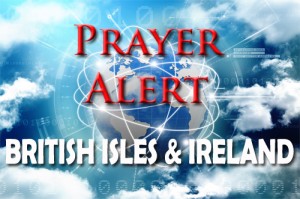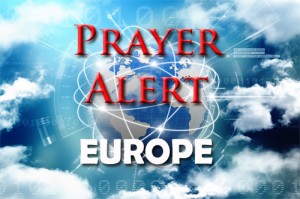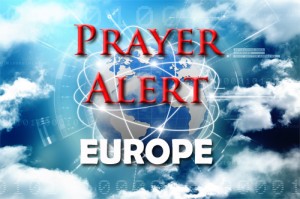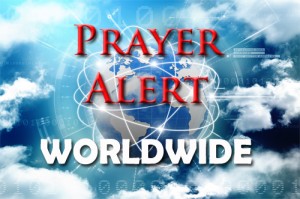
David Fletcher
David Fletcher is Prayer Alert’s Editor.
He is part of a voluntary team who research, proof-read and publish Prayer Alert each week.
If you would like to make a donation towards our running costs, please click here.
Theresa May is currently on a three-day state visit to China, to discuss expanding trade between the two countries. CSW says that while such talks are important, they shouldn’t come at the expense of challenging President Xi on his treatment of Christians. Mrs May’s visit coincides with new restrictions on churches. The government wants all churches to be registered, and to control the appointment of pastors and what they teach. Some Christians simply cannot do that. Christians who are not part of the official, government-sanctioned, church are branded as evil cults. This month in Yunnan Province, six members of an unregistered church were sentenced to up to 13 years in prison for ‘using an evil cult to organise and undermine law enforcement’, and a 500-member church in Shanxi Province was demolished with dynamite.
CofE leaders are concerned that a growing number of parents who discover their child will be born with Down’s Syndrome are choosing to terminate the pregnancy, a pattern which could see such children wiped out completely. The General Synod next week will debate a call to regulate providers of non-invasive prenatal testing, a relatively new test for the condition which carries no risk of miscarriage, unlike older procedures. The Church said that women should be provided with ‘comprehensive, unbiased information’ by doctors and test providers. In a document entitled Valuing People with Down’s Syndrome, the Church warned that the test might lead to major reductions of Down’s Syndrome live births. Iceland and Denmark have screening and almost 100% termination rates. Currently there are unregulated websites offering a blood test for a few hundred pounds, with no context or information about the prospects for someone with Down's Syndrome. See also
Anglo-Catholics warn that proposals to end the 200-year-old split with Methodism 'threaten the fundamentals' of the CofE. A motion will be debated at its General Synod to allow ministers from each church to practise in the other's. If passed, it would be ‘a profound sign of reconciliation, a healing of wounds that go back to the origins of Methodism in the 18th century,' says the Bishop of Coventry. However the catholic wing of the Church places great importance on churches being led by bishops who follow on from Jesus' apostles in ‘apostolic succession’. If the plans are passed by the synod next week and by the Methodist Church in the summer, the two churches will join forces and combine resources in areas where there are challenges in sustaining a Christian presence. It will also mean that for the first time ever, Methodists in the UK will have a bishop of their own.
The Salvation Army has launched a dynamic programme for people with dementia which uses singing to help them connect with others and bring back memories. The scheme, called Singing By Heart, uses a mix of popular hymns such as 'Joy in my Heart' and popular songs like 'Moon River'. Each song (which begins with a Bible passage and finishes with a prayer) has been carefully selected to ensure it is fondly recognised by the people in the groups. It is widely acknowledged that music can trigger past memories and feelings in those living with dementia. The sessions are designed to encourage communication, recollection of memories, and happy thoughts for those taking part. It is also hoped they will benefit carers by giving them time to relax, make friends, and share experiences.
Community leaders, unions and churches are backing a call for Manchester United to increase the pay of workers employed by contractors, such as waitresses and cleaners, noting a ‘grotesque pay difference’ between their wages and players' salaries. On 1 February Manchester citizens handed a letter to the club, urging it to take a ‘community-first business approach’ to ensure that the cost of living is met for low-paid workers. The group said that if new signing Alexis Sanchez is paid £400,000 a week, as some have reported, it will take him just 82 minutes in a game to earn the annual salary of a low-paid stadium worker. Group chairman Rev Ian Rutherford, minister at Methodist Central Hall, Manchester, said, ‘As the winter transfer window closes many workers at Old Trafford will be choosing between putting the heating on or a hot meal.’
In 2017 anti-Putin rallies attracted thousands in remote regions where people opposed Kremlin-run politics and called for credible opposition to be allowed to stand in elections. Alexei Navalny planned to face President Putin in March’s Presidential election, but was banned after dubious fraud accusations. On 28 January he was freed from a twenty-day jail term for organising anti-Putin protests, but was re-arrested the same day. Thousands protested against government corruption outside the Kremlin and across Russia, calling the election a farce and urging people not to vote. Kremlin-controlled media are not covering the protests. Putin is expected to win, but his main concern is getting enough people voting to make the election appear credible. For INSIGHTS into unethical, corrupt elections due in 2018 click the ‘More’ button.
European countries are to send Iraqi refugees back to Iraq if their asylum cases are rejected. Baghdad said returning them should be voluntary, not compulsory. Ivan Sahda Moshi has been hiding at a friend’s house in Gothenburg since 1 December, 2017, when a Swedish ruling demanded he return to Iraq. ‘I hope my case is looked over again,’ said Moshi, a Christian who fled Iraq in 2007. He fears returning, as militias threatened to kill him because he worked with US forces; also Christians are a threatened minority in Iraq. In a similar case, Hassan Amer’s asylum request was rejected by Austrian authorities. He submitted an appeal and is waiting for a new hearing so that he can explain his position. Media reporting about forcible repatriation is terrifying Iraqi asylum seekers.
Abortions are illegal in Northern Ireland and the Republic of Ireland. There is a new wave of youth-driven campaigning on both sides of the abortion argument, which will come to a head over the next few months now that the Irish government has confirmed it will hold a referendum on reform of the country’s strict anti-abortion laws by the end of May.
The following is a shortened version of a prayer given at the opening session of the Kansas Senate. ‘Heavenly Father, we ask your forgiveness and seek your direction and guidance. Your Word says, “Woe to those who call evil good”, but that is what we do. We have lost spiritual stability and reversed our values. We ridicule the truth of Your Word and call it pluralism; we worship other gods, calling it multiculturalism; we endorse perversion, calling it alternative lifestyle; we exploit the poor, calling it a lottery; we reward laziness with welfare; we kill our unborn, calling it choice; we neglect disciplining our children, calling it building their self-esteem; the abuse of power is called politics; we embezzle public funds, calling it expenses; and we call bribery ‘sweets of office.’ Coveting others’ possessions is called ambition, and pornography is called freedom of expression. We ridicule our forefathers’ values, calling it enlightenment. Search us, O God, and know our hearts; cleanse us from every sin and set us free. Amen!’
Bombings are so frequent, the media hardly notice. Last week's assault on Kabul’s luxury hotel received attention because some westerners were victims. Days later, a car bomb killed 100+; last month a suicide bomber killed 41 and a truck bomb killed 150. Afghans live this reality daily. But the greatest conflict is not terrorism, poverty, or drugs. It is spiritual. 99.9% of the population are Muslim, and 72 people groups do not have the Gospel. A missionary writes, ‘A dear sister was murdered in the Kabul hotel bombing, then two days later the office of an NGO working here for many years was attacked and many were killed. This increase in armed aggression against foreigners and NGOs needs re-evaluation by Christian missions. Please pray for wisdom as to how we can improve the safety of our workers, and for much-needed peace and security in the country. There are serious differences between the governor in a northern province and the president. Tension is rising, and there are fears of a feud within the government. Pray that this will be stopped.’










